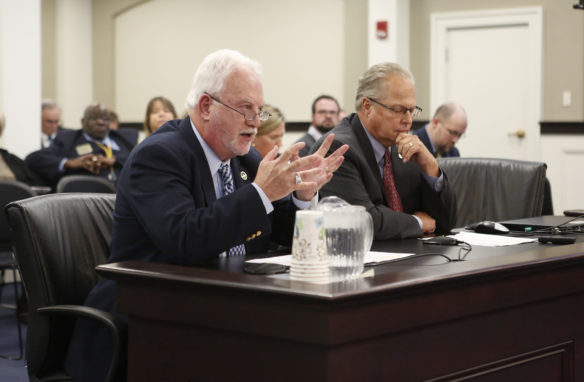
Rep. Bobby McCool (R-Van Lear), left, speaks to the Kentucky General Assembly’s Interim Joint Committee on Education as Sen. Mike Wilson (R-Bowling Green) listens during a meeting at the Capitol Annex in Frankfort. The two men co-chaired a legislative task force that examined Kentucky’s career and technical education system.
Photo by Mike Marsee, Nov. 20, 2019
- One of the task force’s recommendations is to attempt to equalize funding for the state-operated area technology centers and local area vocational education centers that receive supplemental state funding.
- One of the co-chairmen of the task force said there is no “silver bullet” for eliminating inequities in Kentucky’s career and technical education system.
By Mike Marsee
mike.marsee@education.ky.gov
A legislative task force charged with examining Kentucky’s career and technical education system recommended increased funding to address inequities in the system.
The legislators who headed the Kentucky Career and Technical Education Task Force presented a report to the Kentucky General Assembly’s Interim Joint Committee on Education on Nov. 20. They said there is no “silver bullet” that would bring career and technical education (CTE) under one umbrella.
However, they said, there are things the legislature can do to begin to correct inequities in funding, pay structures and access to programs.
“We’re going to have some things that probably need to be done, but (for) the legislators that choose to work on this and wade into it, it will be a big job,” said Sen. Mike Wilson (R-Bowling Green), a co-chairman of the task force.
One of those things is to attempt to equalize funding for the 53 state-operated area technology centers (ATCs) and the 42 local area vocational education centers (LAVECs) that receive supplemental state funding.
“We thought it best to bring the LAVECs up as far as the funding formula,” said Rep. Bobby McCool (R-Van Lear), the other co-chairman of the task force.
That would require substantially more state funding, and David Horseman, the associate commissioner in the Kentucky Department of Education’s Office of Career and Technical Education and Student Transition, said he would welcome that.
“I was encouraged to hear that they were thinking about putting a lot more funding in,” Horseman said following the meeting.
The task force held five meetings from June through October at which it considered structural and funding reforms in CTE that might be recommended to the General Assembly in an effort to ensure that all students have access to high quality CTE programs.
The Kentucky Board of Education asked the legislature in February to create the task force, which is expected to make recommendations prior to the 2020 biennial budget session.
“I believe that the chairs and the committee have a much better understanding of the complexities of the funding,” Horseman said.
Horseman told the panel at its final meeting that a phased approach was the best way to address the worst disparities. He said addressing those funding disparities in the upcoming legislative session would create a more equitable system of CTE centers.
McCool told the education committee that increased funding should be accompanied by increased accountability that includes examining labor outcomes for students in CTE pathways.
“We need to be more accountable, and by doing that we need to make sure on performance-based funding that we look at outcomes,” he said.
He said another priority for the legislature should be to encourage stronger curriculum alignment between ATCs, LAVECs and the Kentucky Community and Technical College System (KCTCS).
“I think we’re in good shape with that. Our office has and continues to work with KCTCS on career pathway development and alignment as part of our everyday work,” Horseman said.
Wilson noted that while funding should be prioritized to programs that serve high-demand labor areas, some areas might have specialized labor needs that also should be a priority.
“We need to allow for waivers to be given for districts that do not allow for labor certification criteria based on the needs of their area,” he said. “They may have an industry there that is a greater need, (and) they should be able to get that designation as a high-need area.”
He told his fellow legislators that changes in the CTE system are necessary to better prepare students to fill needs in the workforce.
“We’re going to have to try to meet these needs through our education system,” Wilson said. “We’ve thrown a lot of things at you, but we don’t really have one silver bullet – and I don’t know that there is – to try to fix the system.”
KDE is expected to have a role in drafting proposed legislation that results from the panel’s recommendations.
MORE INFO …
Coverage of previous meetings of the Kentucky Career and Technical Education Task Force:




Leave A Comment